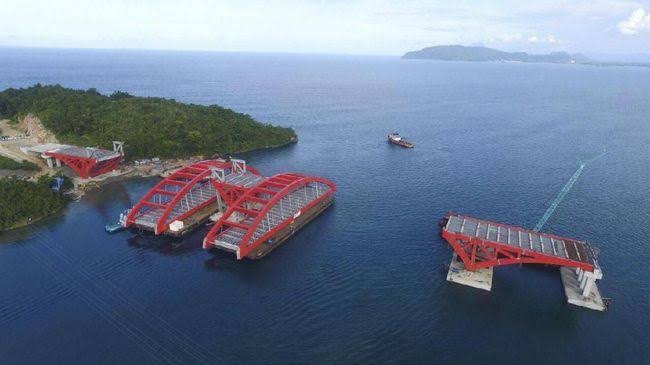The Papua Sea Highway Has a Positive Impact on the Community
By: Abner Wanggai) *
The existence of the sea highway has a positive effect on society. They can ride more flexibly since there is this special toll road. In addition, after the sea toll was implemented, the price of important goods such as cement decreased, because transportation costs also fell. Since the transport trailer can pass the sea highway.
The sea highway is a unique freeway, because it is above the sea. The development of this toll road is being encouraged by the government, because its existence is urgently needed by the community. As an important infrastructure to facilitate transportation, and also facilitate the distribution of goods from Jayapura to other cities, and vice versa.
Wisnu Handoko, Director of Traffic and Navy of the Ministry of Transportation, said that there are 23 sea highway routes in 2020. This will make it easier for goods delivery to remote areas of Papua. According to him, with the sea highway, the prices of goods can also drop by up to 30%, due to cheaper transportation costs.
The proof is that the cement price in the Papua region could fall by up to 28%. In the mountainous region of Papua, the price of cement can reach 500,000 per sack. However, since there was a sea highway, the price could be reduced to around 300,000 per sack. If the price can go down, it will be very beneficial for Papuan civilians, because they can save money.
Lower prices when there are sea tolls, because there is no need to send via airplane. In the past, Papua relied on air transportation, because its territory was forested and mountainous. Na mun higher jet fuel prices, so the cost go up, and the impact on prices craze.
However, now the delivery can be via sea toll, and it can reduce the price of goods. In addition, the shipping route goes to the farthest areas such as Merauke. So that the people there can enjoy the basic necessities because the stock is always available, thanks to shipping via sea highway. The price is also affordable for them.
If the price of goods falls, it will have an impact on the welfare of the community. They don’t need to be confused because they have to buy rice or other basic necessities at high prices. But can buy it at a reasonable price. So there are no complaints that the price of goods in Papua is choking, much more expensive than in Java.
Yahya Kuncoro, Director of Business and Transportation of Sea Toll Goods, stated that PT Pelni invited all local governments to take advantage of the sea toll. So that the distribution of goods to the 3T area (the most distant, the frontier, and the outermost border) is even. He invited the regional government to market products that are grown by farmers, to remote areas such as the tip of Papua.
Equitable distribution is very important, so that people in Papua can also enjoy shipments from Java and other islands, at affordable prices. They will have no more trouble getting rice and other crops, because not all plants can grow on Earth of Paradise. The reason is due to different soil and climate factors.
When inter-island transportation can run smoothly with the sea highway, it will not only benefit the Papuan people. But also people on other islands. They can enjoy the original Sago of Cendrawasih and other crops at a more affordable price.
Affordable prices for goods when sent via sea toll occur because in 2020 there was a subsidy provided by the government. In 2021, the subsidy will be cut gradually, but the price to be paid when passing the sea highway is guaranteed to be affordable. So that it will not be burdensome to the people and entrepreneurs who use it.
The existence of a sea highway in the Papua region is very beneficial for the community, because transportation becomes smooth. Apart from that, the distribution of goods is also easier, because it reaches very far away areas such as Merauke. There will be equal distribution of basic necessities and other goods, so that the principle of justice will occur in Papua.
) * The author is a Papuan student living in Yogyakarta
